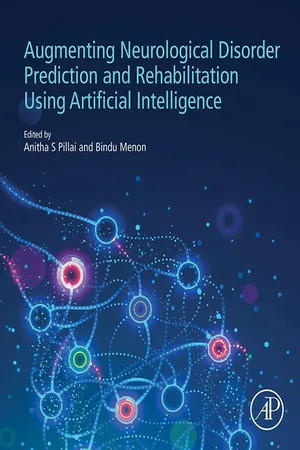
Augmenting Neurological Disorder Prediction and Rehabilitation Using Artificial Intelligence
- 362 pages
- English
- ePUB (mobile friendly)
- Available on iOS & Android
Augmenting Neurological Disorder Prediction and Rehabilitation Using Artificial Intelligence
About This Book
Augmenting Neurological Disorder Prediction and Rehabilitation Using Artificial Intelligence focuses on how the neurosciences can benefit from advances in AI, especially in areas such as medical image analysis for the improved diagnosis of Alzheimer's disease, early detection of acute neurologic events, prediction of stroke, medical image segmentation for quantitative evaluation of neuroanatomy and vasculature, diagnosis of Alzheimer's Disease, autism spectrum disorder, and other key neurological disorders. Chapters also focus on how AI can help in predicting stroke recovery, and the use of Machine Learning and AI in personalizing stroke rehabilitation therapy.
Other sections delve into Epilepsy and the use of Machine Learning techniques to detect epileptogenic lesions on MRIs and how to understand neural networks.
- Provides readers with an understanding on the key applications of artificial intelligence and machine learning in the diagnosis and treatment of the most important neurological disorders
- Integrates recent advancements of artificial intelligence and machine learning to the evaluation of large amounts of clinical data for the early detection of disorders such as Alzheimer's Disease, autism spectrum disorder, Multiple Sclerosis, headache disorder, Epilepsy, and stroke
- Provides readers with illustrative examples of how artificial intelligence can be applied to outcome prediction, neurorehabilitation and clinical exams, including a wide range of case studies in predicting and classifying neurological disorders
Frequently asked questions
Information
Table of contents
- Cover image
- Title page
- Table of Contents
- Copyright
- List of contributors
- 1. Intracranial hemorrhage detection and classification using deep learning
- 2. Deep learning for noninvasive management of brain tumors
- 3. Artificial intelligence in Parkinson’s disease—symptoms identification and monitoring
- 4. Alzheimer’s disease detection using artificial intelligence
- 5. Intelligent computer systems for multiple sclerosis diagnosis
- 6. Current and future applications of artificial intelligence in multiple sclerosis
- 7. Artificial intelligence–assisted headache classification: a review
- 8. Deep learning for reliable detection of epileptogenic lesions
- 9. Artificial intelligence in neurosciences—are we really there?
- 10. Artificial intelligence in the management of neurological disorders: its prevalence and prominence
- 11. Graphical assessment of the internal structure of Parkinsons dataset—a case study
- 12. Applications of artificial intelligence to neurological disorders: current technologies and open problems
- 13. Developing a chatbot/intelligent system for neurological diagnosis and management
- 14. Artificial intelligence in the diagnosis and management of acute ischemic stroke
- 15. Towards intelligent extended reality in stroke rehabilitation: Application of machine learning and artificial intelligence in rehabilitation
- Index